Key takeaways:
- An ethical marketplace focuses on fair trade, sustainability, and social responsibility, impacting communities and the environment positively.
- Researching product origins and evaluating brand practices, including certifications, can lead to more informed and responsible purchasing decisions.
- Building relationships with ethical brands enhances consumer experiences and fosters accountability in shopping habits.
- Setting specific goals and reflecting on personal values can significantly transform shopping habits towards more ethical choices.
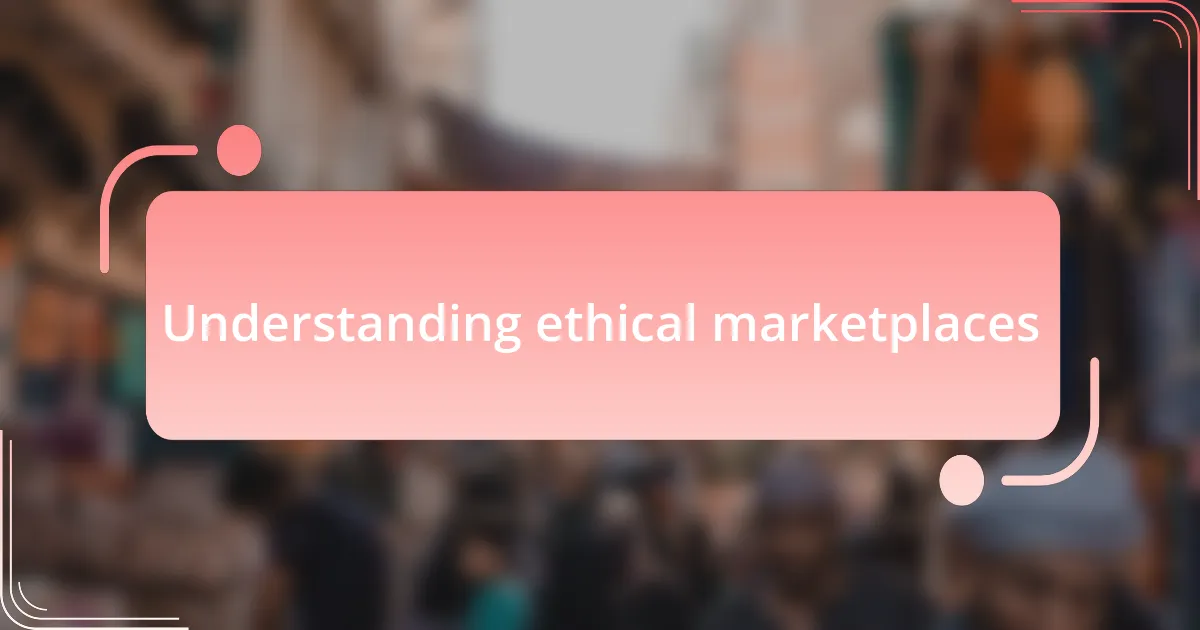
Understanding ethical marketplaces
An ethical marketplace prioritizes fair trade, sustainability, and social responsibility in the products and services it offers. I’ve often found myself wondering how my purchases impact the world around me. It’s this curiosity that has deepened my understanding of how choosing where to shop can resonate beyond mere transaction—it can support communities and reduce environmental harm.
In my journey toward ethical consumption, I’ve discovered brands that are not just about profits but also about people and the planet. I vividly remember my first visit to a local cooperative, where I met artisans who poured their hearts into their crafts. It was enlightening to see the stories behind the products and to feel that my choices could uplift someone’s life.
Ethical marketplaces often provide transparency, allowing consumers to trace the origins of their purchases. Have you ever stopped to think about who made the shirt you’re wearing? I have, and it made me realize that every item I buy is a reflection of my values. Understanding this connection has transformed my shopping habits and inspired a deeper sense of accountability in my choices.
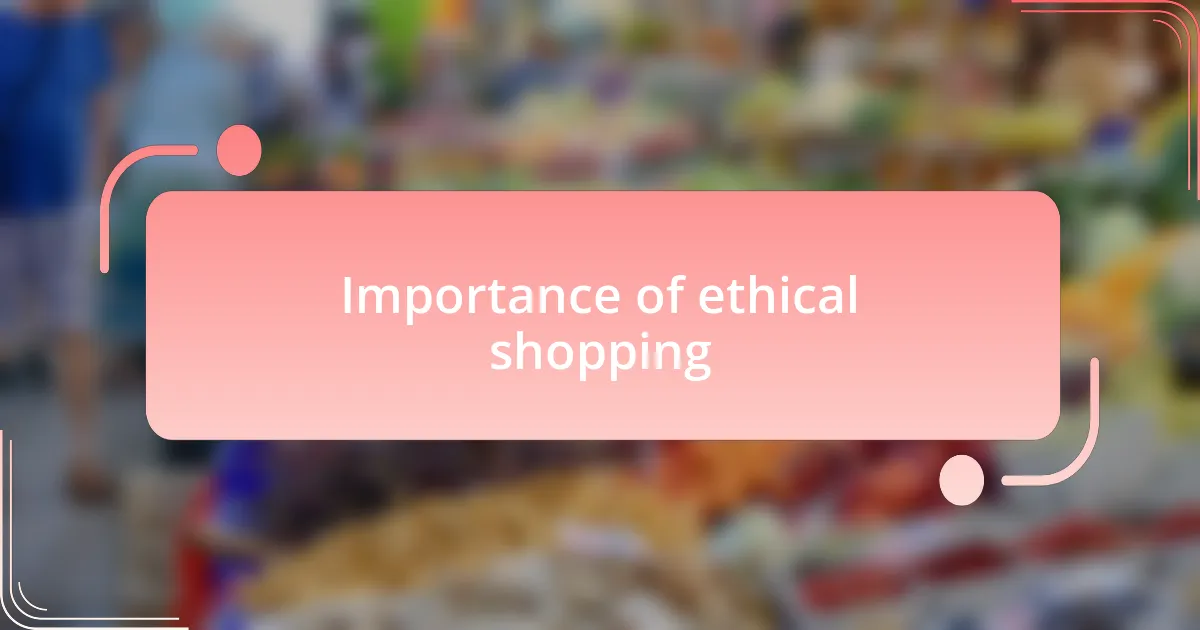
Importance of ethical shopping
Ethical shopping is essential because it holds the power to influence change on a global scale. I vividly recall an experience when I chose to purchase handmade goods from a small fair-trade organization instead of a mainstream retailer. The satisfaction that came from knowing my money supported artisans’ livelihoods and encouraged sustainable practices felt profoundly fulfilling, reshaping how I view my role as a consumer.
Moreover, every time we consciously choose ethical options, we speak against exploitation and environmental degradation. It can sometimes feel overwhelming to think about the consequences of our choices, but I find that every small shift does add up. Have you ever thought about how your dollars can advocate for a cleaner planet and better labor conditions? Facing that reality has encouraged me to take more responsibility when shopping.
The ripple effect of ethical shopping is both immediate and far-reaching. I’ve seen firsthand how communities thrive when consumers prioritize fair treatment and ecological sensitivity. Recently, I joined a community event focused on local sustainability, where I met people whose lives had been positively affected by ethical brands. It was a powerful reminder that my purchasing decisions could foster support for initiatives that create meaningful change.
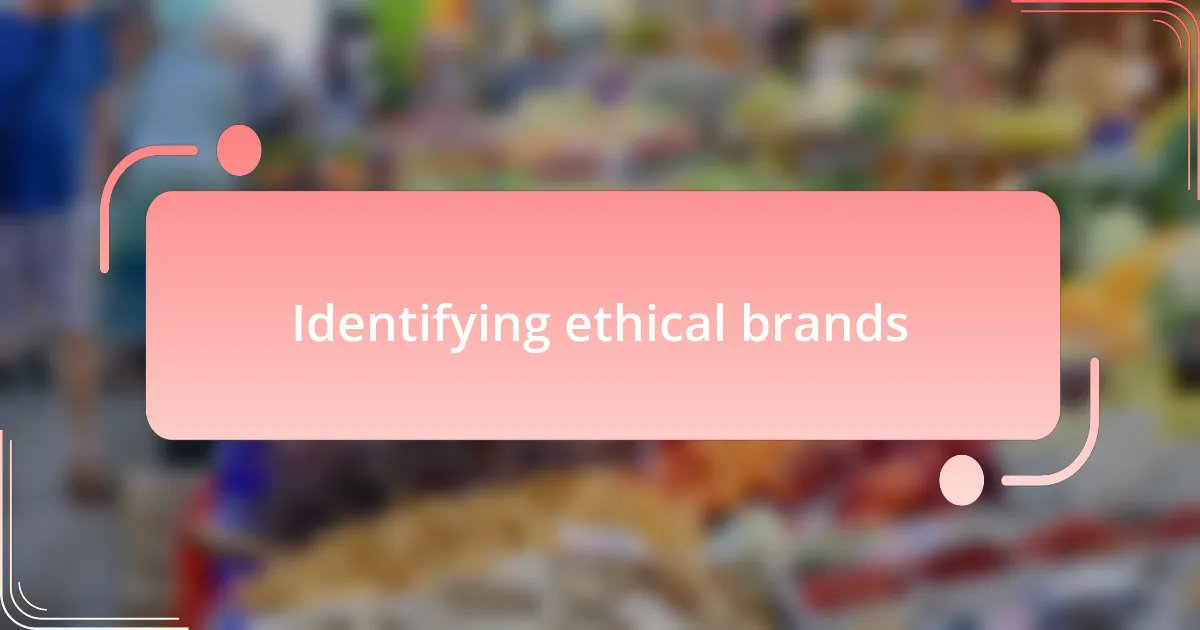
Identifying ethical brands
When I set out to identify ethical brands, I realized it was about more than just looking for labels. One day, while browsing through a local market, I stumbled on a booth selling organic skincare products. The vendor shared stories of how the ingredients were sourced sustainably and how fair wages empowered local farmers. Listening to her passion made me appreciate the connection between product and purpose.
In my journey, I’ve learned that transparency is key. I often check a brand’s website for information about their sourcing and production practices. If a company is proud of its ethics, they’re usually willing to share their story openly. Have you ever experienced the empowerment that comes from knowing your purchases support fair labor? When I discovered a clothing brand that details its supply chain and works with artisans directly, it felt like a breath of fresh air.
Sometimes, it’s also vital to hear from others; customer reviews can be a goldmine for insights. I recall a time when a friend recommended a coffee brand committed to fair trade practices. Inspired by her experience, I made a purchase and tasted the genuine difference—both in flavor and in knowing the farmers were treated well. When I think about these moments, it reinforces my belief that finding ethical brands isn’t just about ticking boxes; it’s about building relationships based on trust and shared values.
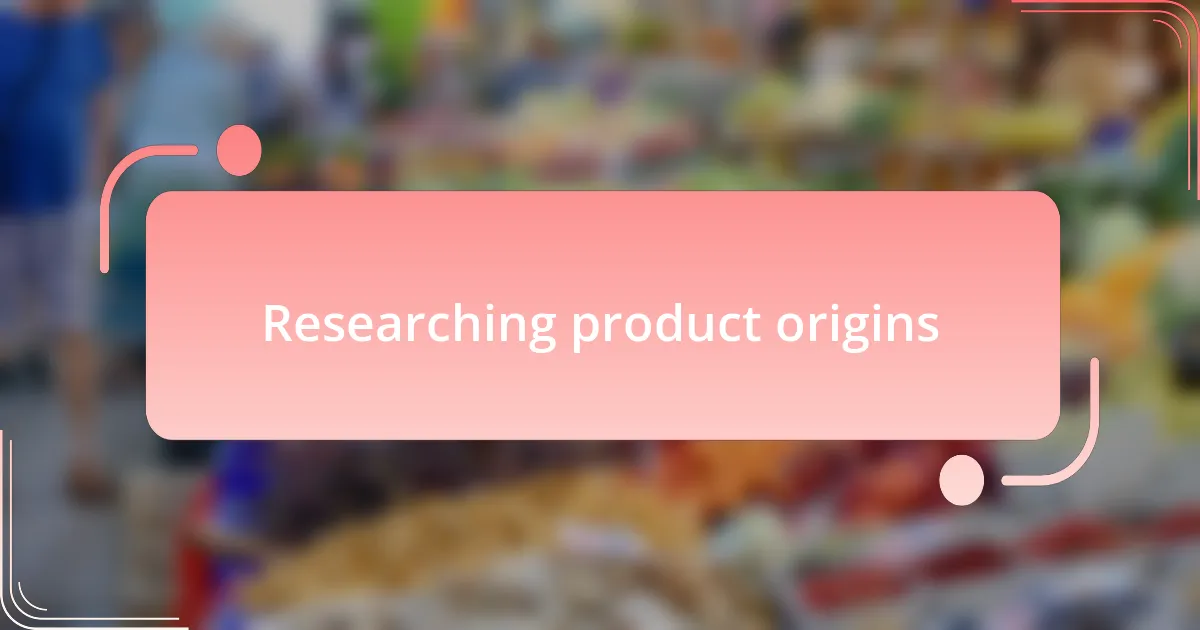
Researching product origins
Researching product origins has become an essential part of my shopping process. One evening, I decided to look into the chocolate bar I used to grab without a second thought. What I found startled me—many brands sourced their cacao from areas rife with child labor. It made me rethink every sweet bite, reminding me that my choices ripple far beyond my own enjoyment.
I’ve learned that digging deeper can lead to some eye-opening discoveries. When I explored a brand of handmade ceramic mugs, I found their production involved a cooperative of artisans in Mexico. This knowledge transformed my appreciation for the mug itself; it wasn’t just a vessel for my morning coffee but a piece of culture, skill, and love crafted by hands I could now envision. Doesn’t it feel rewarding to sip from something that tells a story?
In my experience, online resources have been invaluable for tracing product origins. I once came across a website dedicated to ethical consumerism that listed brands by their transparency ratings. It was enlightening to see how some companies proudly displayed certificates and partnerships, while others left me with more questions than answers. Isn’t it reassuring when brands empower consumers through their commitment to ethical practices? I often share these insights with friends, urging them to consider where their products come from, sparking conversations about intentional living and mindful consumption.
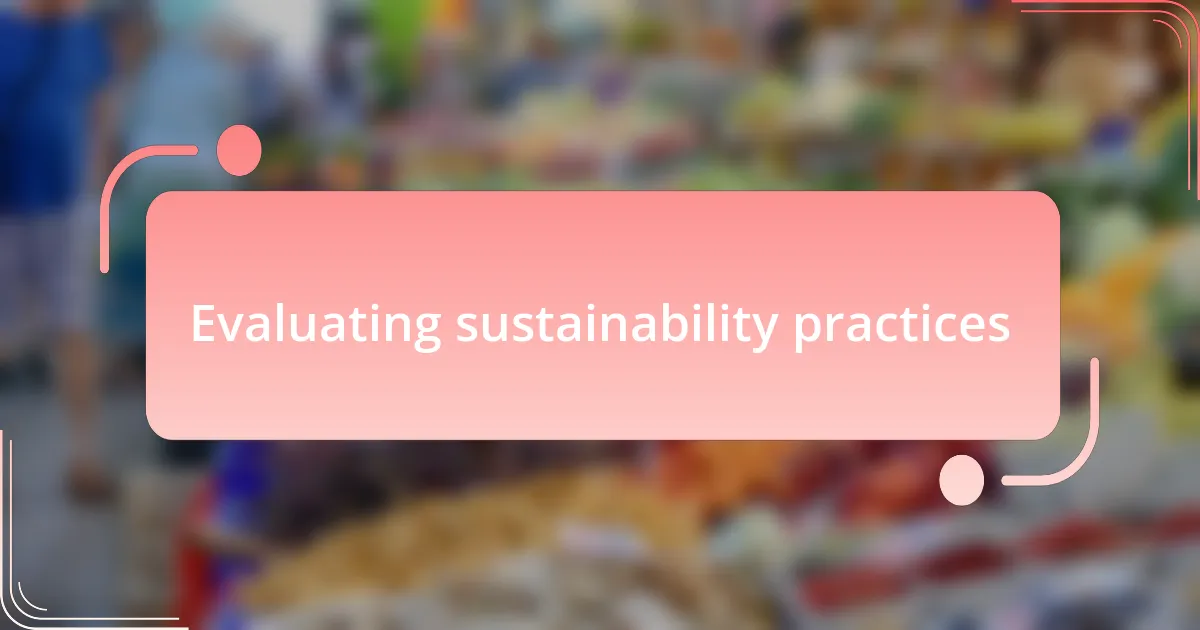
Evaluating sustainability practices
Evaluating sustainability practices requires a close examination not just of a brand’s marketing claims, but also the actual impact of their operations. I remember visiting a local clothing store that proudly touts “sustainable fashion.” Initially, I was drawn in by the vibrant displays. However, once I learned about their sourcing practices, which included unsustainable cotton and fast production cycles, my perception shifted entirely. Shouldn’t sustainability go beyond just a catchy phrase?
I’ve also found that certifications can be a useful tool in evaluating brands. For instance, I once stumbled upon a skincare line certified by the Soil Association, which promotes organic and ethically sourced ingredients. This simple label transformed my shopping experience, as I began to trust that each product aligned with my values of sustainability and eco-friendliness. Does it feel more satisfying to support brands that align with your personal ethics?
Furthermore, I’ve come to understand the importance of direct communication with companies. I recall sending an email to a furniture brand that I admired, inquiring about their wood sourcing practices. The response was both enlightening and reassuring, revealing their commitment to responsible forestry. Isn’t it empowering to get clarity directly from the source? Engaging in such dialogues has not only informed my choices but also deepened my connection with the brands I support.

My journey to ethical shopping
My journey to ethical shopping began unexpectedly during a routine trip to the grocery store. I picked up a product that looked appealing, but when I checked the label, I was shocked to discover the environmental impact of its production. This moment sparked an awakening in me—how many times had I made purchases without fully grasping their implications? It was time for a change.
As I delved deeper into ethical shopping, I stumbled upon a documentary about the fashion industry that left a lasting impression on me. Watching the stories of workers who faced exploitation was a wake-up call. I felt a profound sense of responsibility. Could I really continue supporting brands that contributed to such injustices? That realization pushed me to prioritize companies that treated their workers fairly and responsibly.
Recently, I attended a local fair featuring artisans committed to sustainable practices. I was captivated by their stories and the love they poured into their crafts. Each purchase felt like a contribution to a larger movement. How exhilarating it was to know that my choices were supporting not just a brand but also a community dedicated to doing better! The connection I formed that day solidified my commitment to ethical shopping, making it much more than a mere transaction—it’s a mission I carry with me every day.
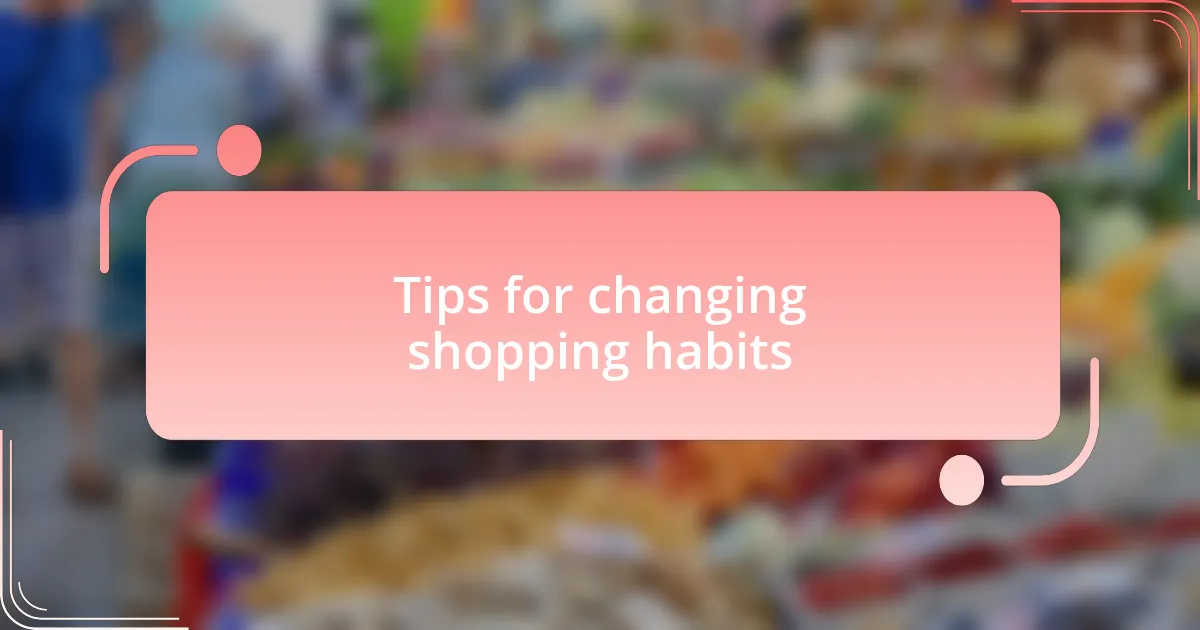
Tips for changing shopping habits
When I decided to change my shopping habits, I began by setting specific goals. For instance, I challenged myself to buy only from brands that openly shared their ethical practices. This simple step not only narrowed my options but also made me feel a sense of purpose with every purchase—like I was part of a bigger story.
I also found it helpful to create a list of my core values. Do I prioritize sustainability, fair trade, or eco-friendly materials? By defining what matters most to me, I made more informed choices in the aisles. Have you ever considered how knowing your values can transform the way you shop? I realized that it not only simplifies decisions but also enriches my shopping experience.
One effective tip I adopted is to pause before buying—just a moment to reflect. This practice often leads me to ask, “Do I really need this?” or “What impact does this have?” It’s amazing how this brief pause can lead to more meaningful purchases. I’ve found that taking a little time to think can reduce impulse buys, allowing me to invest in things that truly align with my values.